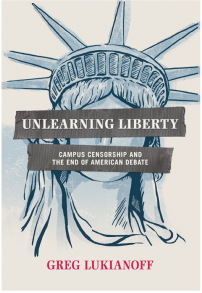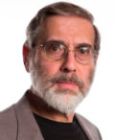Bullying
Unlearning Liberty: Campus Censorship/End of American Debate
You must read this book if you care about our nation's future
Posted November 1, 2012

When I say that Unlearning Liberty is the most important book you can read, I am not engaging in hyperbole. And don’t just take my word for it. It has been enthusiastically endorsed by some of our leading thinkers, such as Steven Pinker and Nat Hentoff. The very future of our society depends upon recognizing and reversing the insidious process that is its subject. Our greatest resource is the minds of our children, and what they learn in higher education ultimately shapes society.
Greg Lukianoff is a true hero for our times. A hero is someone who possesses a combination of courage and wisdom, for courage combined with foolishness leads to disaster, and wisdom without courage is a barren mental exercise. Lukianoff has written a compelling book, loaded with wisdom, in the attempt to save our society from its growing, self-destructive assault against our most basic freedom, freedom of speech. As lawyer for the Foundation for Individual Rights in Education (FIRE), he has bravely challenged the administrators of our nation’s most prestigious universities. He is a political liberal, but doesn't hesitate to criticize his fellow liberals when they promote "politically correct" but unconstitutional speech codes. He is an atheist, but courageously defends fundamentalist Christian groups from attempts of administrators to force them to violate their own religious principles.
Aldous Huxley’s Brave New World and George Orwell’s Nineteen-Eighty-Four are among the literary masterpieces of the twentieth century. These highly revered books warn against totalitarian police states that control the minds and feelings of their citizens. The “Evil Empire” that was the former Soviet Union was such a place. In the name of protecting its citizens, the government exerted control over all aspects of their lives, engaged in massive brainwashing, and turned “comrades” into spies and snitches against each other. People feared to talk freely even in their own homes for fear that their children would turn them over to the authorities. They were afraid to laugh, for laughter could be suspected as a sign that they were ridiculing the system.
Fortunately for its hundreds of millions of suppressed citizens, our own government worked relentlessly to bring about its downfall. Ironically, in the same period since we helped free the minds of our Soviet brethren to the East, our own country has been progressively shackling the minds of its citizens, especially in schools.
We seem to have forgotten that a couple of centuries ago, after the thirteen colonies freed themselves from the tyrannical rule of Britain, our Founding Fathers assembled to create a Constitution for their newly independent nation. These highly intelligent and educated men who studied philosophy and law in depth deliberated greatly over everything they put in the Constitution and Bill of Rights. They succeeded in establishing what is generally recognized to be the freest, most successful country in history.
The most basic right they guaranteed the citizens was freedom of speech. They understood that a healthy society must allow people to say what they think even if others find it offensive. Imagine what navigation would be like if people were not allowed to challenge the belief that the world is flat. Where would medicine be if we were forbidden to challenge the ancient belief that our bodies are governed by four humors? Where would physics be if Einstein were not permitted to question Newton’s teaching that matter, energy and time are discrete entities? What would life be like for homosexuals if we were not allowed to challenge the Biblical prescription to kill men for having sex with each other? And how in the world will we ever solve the perplexing problem of bullying if we cannot challenge the orthodox approach that is failing dismally? Nowhere is free speech more necessary than in our schools of higher education. As Lukianoff repeatedly explains, university students need to be exposed to ideas and words that they can find offensive. A higher education that does not challenge the minds and feelings of its students is a failure.
Though few people are aware of it, freedom of speech is a corollary of the Golden Rule, the universally recognized principle of morality and formula for social harmony. How would you like it if I could get you punished whenever I felt offended by what you said? Just as you would like to feel free to say what you want without getting punished, you must allow others to say what they want, no matter how much you don’t like it, without getting them punished.
Furthermore, freedom of speech is the solution to the bullying epidemic. Most bullying is verbal, and even most physical aggression begins with words. The reason we become victims of bullying is that we believe, “You have no right to say that!” Then we become upset with the offender. However, by getting upset we are unwittingly reinforcing the offender, so he/she continues with the verbal attack and the hostilities escalate. But when we realize that people “do have the right to say that,” then we don’t get upset, and the offender quickly stops attacking us. In the process, they also like and respect us more. This is the wisdom underlying the traditional slogan, “sticks and stones may break my bones but words will never harm me,” the age-old solution to verbal aggression.
Unfortunately, the past few decades has seen a profound shift in the goal of education. Social scientists determined that society’s most urgent mission is to protect people from feeling offended. They have concluded that words are even more devastating than physical attacks and declared the “sticks and stones” slogan to be a lie, replacing the conclusion with “but words can hurt forever” or “but words can kill.” In this vein, they have come to see freedom of speech as the problem rather than the solution. Because they never studied philosophy of law and the purpose of freedom of speech, they have been aggressively lobbying for laws repealing this precious right. Forty-nine of our fifty states have passed school anti-bullying laws that require schools to guarantee that children can go to school without feeling disrespected by anyone (Montana is still working on its version). Whenever these laws are discovered to fail, with another student committing suicide, the laws are intensified. My own state of New York has passed a Dignity for All Act, which puts the final nail in the coffin of freedom of speech. We are no longer allowed to say anything that can offend anyone for any possible reason. Despite the eradication of freedom of speech, people continue to kill others and themselves because they cannot tolerate feeling offended.
Throughout Unlearning Liberty, Lukianoff documents the injustices committed by universities in their efforts to eradicate offensive speech and the resulting damage to students’ ability to think critically and control their emotions. But one of Lukianoff’s most startling discoveries in his years of work for FIRE is that speech codes that are designed to protect students are used most often by administrators to protect themselves. As in all totalitarian police states, they use the codes to punish students and faculty that dare to criticize the administration! Surveys have indeed confirmed that the majority of university professors do not feel safe to express themselves freely.
I, as the world’s most persistent critic of antibullyism, have experienced first hand the very issues Lukianoff writes about. I have seen how this movement meant to promote tolerance is promoting intolerance (just read the comments to my Psychology Today blog); how the effort to promote social justice is resulting in injustice; how academic journals refuse to publish anything that challenges the orthodox approach to bullying despite its obvious failure; how people have learned to use accusations of being offended or bullied as a tactic to win arguments and stifle debate; how vague terms such as “harassment” and “bullying” allow schools to punish children for engaging in constitutionally protected behaviors; how anti-bullying laws have outlawed humor; how teaching children that words can cause them irreparable harm is fostering a generation of emotionally vulnerable children who have little ability to handle the ordinary stings of life.
And that’s why I am so excited by Unlearning Liberty. I hope it becomes a runaway best seller so society can begin saving itself from its well meaning but misguided attempt to protect people’s feelings. To create educational policies and laws that maximize human wellbeing and achievement, we need to be guided by legal scholars like Lukianoff who understand the philosophy of law and appreciate the brilliance of our Constitution rather than by legally naïve social scientists lobbying the government to promote their own scientifically questionable political agendas. No serious legal scholar would endorse the idea that we can create a society in which no one exerts any power over anyone else by invoking the power of the government to punish anyone who exerts power over anyone else. That is a recipe for a totalitarian police state.
If wish I were capable of writing a review that does justice to this book, which is packed full of valuable insights and revelations, and written with an eloquence and depth I can only envy. Go out and buy it. The profits go to FIRE, so that Lukianoff and staff can continue doing their essential work.
Transparency Declaration: I declare that I do have a financial interest in a company that offers products and services that may be related to the content of my writings.
Author's Policies Regarding Comments: 1. I rarely respond to comments because I simply don't have the time. If I don't respond to your comment, please don't take it personally. 2. Psychology Today has a strict policy about nasty comments. I believe in free speech and rarely censor comments, no matter how nasty. Every nasty comment by adults––especially by ardent anti-bullying advocates––illustrates how irrational it is to expect kids to stop engaging in bullying.




